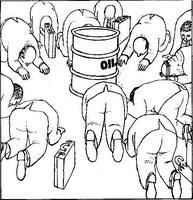 What if all of a sudden Jamaica were to strike it rich, like we discovered a source oil, natural gas, gold or diamonds?
What if all of a sudden Jamaica were to strike it rich, like we discovered a source oil, natural gas, gold or diamonds?
Evidence suggests that that could be one of the worse things we could wish upon ourselves.
Trinidad is currently undergoing an oil and natural gas boom that is fast becoming a source of concern to some of its citizens.
Why so?
Recent past history tells us that developing countries that “discover” a single source of a new mineral commodity end up wrecking their economies. Oil and natural gas are the most recent instigators, but gold, diamonds and other precious ores have also played their part.
How does this happen?
Well, believe it or not, it could be compared to hitting the lottery, which often involves
- changing locks, phone numbers, addresses, names, etc. to gain some relief from the public
- being informed of “new” cousins that claim kinship, and a cut of the winnings
- family members and friends who refuse to talk to you after you refuse them their “share”
- complicated new choices on taxes and investments
- hiring a lawyer and accountant (at least)
- new “friendships” based on what you have, rather than who you are
- saying “No way” more often than “Yes” to worthy causes and needy people
- being included by thieves and other dirty, rotten scoundrels in their short to medium term career planning
I have never won anything in my life, but I once met someone whose lottery-winning uncle refused to fund her continuing education once she decided to switch from Pre-Med… causing her to drop out in mid-semester.
The problem with a windfall is that it distorts things. Undeserved and unearned resources are placed in our hands. We have an instant material power that is unmatched with equal wisdom. Our capacity to live life productively remains unchanged, but Lady Luck has granted us the fruits of a windfall and fate demands that we deal with them nonetheless.
The new NBC series “Windfall” offers an interesting and dramatic account of one group of lottery winners.
Trinidad’s current windfall is actually its second, and the last one was bad enough and recent enough to have those with long memories nervous. Some of the effects of $75+ per barrel oil are already plain to see.
- Rising GDP and government revenue have served to stimulate an appetite for instant wealth, leading to a startling increase in kidnappings. The disparity in income between the lucky and the unlucky expands dramatically and quickly.
- Government’s desire to increase employment led to the creation of artificial employment in the form of the CEPEP program and others. In short, they provide a decent wage for a disproportionate (in other words, small) amount of value. The end result is an indecent one, however – first wage inflation, and now a labour shortage.
- Increasing traffic, but few new roads being built. Several spots have become nightmares, such as the roads into Maraval and Diego Martin.
- Port of Spain’s real estate prices have risen dramatically fuelled by the demand by expats related to the oil industry
- While the oil and natural gas sectors are booming, the non-oil related economy is stagnant. In short this means that the only thing separating Trinidad from other developing countries is the price of oil on the world market – a commodity price over which the country has no influence
Could we expect the same things in Jamaica if we were to make the same kind of discovery?
- Would our crime increase in the same way, as people’s expectations collectively rise more quickly than incomes?
- Would our real estate prices also explode?
- Would government policies also encourage under-employment, and a labour shortage?
- Would the economy come to rely on unsustainable factors such as the price of oil on the world market?
Countries such as Nigeria and Venezuela have clearly suffered historically from their windfalls, leading some to say that the discovery of oil is the worst blessing that a country could pray for.
The remedy seems to lie in a commitment by government to the long term development of its people, increasing education and its sister, productive capacity, faster than expectations of instant wealth.
Would our politicians resist the temptation to forego easy spending to gain votes? Finance Minister’s Omar Davis’ recent admission that he authorized election spending to gain votes legitimized common, if unspoken knowledge. His words gave us no confidence that he and others would act any differently.
